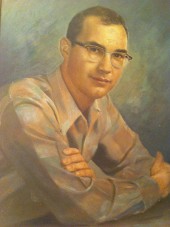May 4, 2010.
To Ryan Gierach, editor of WeHo News:
I think it is a generic thing to live in a big city, mostly for economic reasons in the past, if not cultural, etc., and later in life wonder how things are, and remember how they were, in the usually small town you grew up in.
I have often said that at almost 79 years of age, I know how “things turned out” since I have “lived” the future I wondered about when I walked the campus at LSU for the last time in February of 1955 to go directly into the Army (volunteer draftee for those who don’t know how men were drafted in those times).
From there I went directly to Los Angeles where I had decided as a youth I wanted to live. And to show my “politics,” at LSU, 1952, I had worked for Adlai Stevenson for president, and in L.A. in 1956. I handed out brochures for him in the middle of Vermont at 3rd in front of Ralph’s Grocery, and I’m still a liberal Democrat today.
Most of us seem to have the same pattern—I read of people who have passed away, died, and most had the same thoughts I did as they grew old: As we look back, we see a pattern which we did not see at the time, and most would not change a thing.
That is interesting since I see several movies in which an adult suddenly finds him or herself back in their youth with the possibility of changing their lives. In the current movie 17 Again, the adult goes back to his high school days where he gave up a possible career as a basketball player to leave to support his pregnant girlfriend. He had later mistakenly blamed her for his unhappy life. Yet, when given this second chance, he makes the same decision now understanding that she was not the problem, and he loves her and his kids all the more (he does change jobs which was part of his true unhappiness).
I suspect something similar would be true of most of us.
As to how people “are” in the Midwest: I have visited (Indiana), and I see no difference in any of the places I go, and I now live back in Louisiana where I grew up and find the same types of people I did in over 30 good years in L.A. and in side trips to the Four Corners area.
It seems today, with the Internet, cell phones, and fast planes, we can live almost anywhere and travel often to visit with friends and cultural events in other areas.
But I doubt drivers are any better in most places — try fighting traffic in Dallas or Houston where people are just as rude as L.A.—and check out people, those places we actually walk in these days—and you will find overweight people everywhere. While I haven’t driven in L.A. much the last decades, I know that most people were courteous, allowed you to enter the freeway, etc., which is not true of people in Dallas or Houston. The point is that we learn that if we don’t let others enter and change lanes then they won’t let us, and the whole system will come to a halt.
It is my idea that politicians should learn how our nation can run by seeing how we all travel on the highways—not knowing who is in the other cars or what their politics or religion are. In small towns, we don’t fuss so much because that “nut” in the other car probably is a relative or neighbor whom we like, so we just ignore their bad driving.
There obvious advantages of living in a big city where no one knows you, but there are other advantages of living in a smaller town where they do. And it is interesting how when you meet other people and ask them where they would live if they could live anywhere, no one particular city or state is chosen by most.
Me, I just want to get there often to eat at Philippe’s—I still don’t know how to spell it, but love the poboys—or to Patys in Toluca Lake, or just to get a Tommy’s cheeseburger, or go to “apple country” near Yucaipa, or walk in Yosemite and visit with friends.
That is what the tourist bureaus need to find out: what people do want and what you can offer that is different from what other cities or states have.
That is why LA has New Orleans—hopefully—and Cajuns and Creoles, and no other state offers this entertainment and education.


